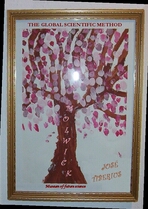1. PHILOSOPHY OF SCIENCE
Our planet, the Earth, is one of the billions of planets, infinite perhaps, in the immense Universe. Since the very beginning, living beings have tried to understand life and seek out the logic of the world, which explains the origin and the development of philosophy.
In order to understand why both the evolution of science and the scientific method have considerably failed with the acceptance of very weak paradigms and theories from the common sense viewpoint, Molwickpedia books include some remarks on the philosophy of science.

Many of those remarks are now present in this book of the Global Scientific Method.
At the same time, the defense of the current scientific method seems vital because it is one of humankind and life’s great conquests. However, it would be convenient to cast off some of the nineteenth-century millstones and twentieth-century obstacles, among which we would emphasize their atheistic complexes and utilitarian shroud, respectively.
1.a) Concept of science
If we contemplate the concept of science or ask ourselves what science is, we will have to turn to an external discipline, the philosophy of science.
Without doctrinal presumptions, philosophy divides into three broad groups: the methodology of pure philosophy or epistemology, the study of scientific knowledge or philosophy of science, and metaphysics, or meta-science, if preferred.
Philosophy analyzes the world of what can be possible, and science is limited to the proven world. If the philosophy of science has no proof, it restricts concepts, while general philosophy needs proof to limit a concept.
The Philosophy of science understood as a level of reasoning which leads to the concept of science and not as an academic discipline that uses many Latin or Greek words and quotes countless authors. It is like the self-limitation that the little boy philosopher sets for himself to discover those wonders of the new world that have profound common sense.
The aim of this book is not to be an exhaustive treatise about the scientific method; on the contrary, it just presents some reflections on certain relevant aspects.
Chapter I dedicates a whole section to scientific knowledge and another one to its sources and characteristics.
Perception, intuition, and logic are the three weapons used by man to strengthen his control over nature. As we will see, the so-called scientific method has variants based on these three instruments.
Perception and logic are the two polar concepts, while intuition would be in the middle, which allows it to formulate theories that surpass the theories developed through logic and perception or the combination of both. To a certain extent, all theories are a combination of the three.
On the other hand, even from the philosophy of science perspective, we cannot deny that sometimes madness made possible science evolution, by proposing topics that previously seemed impossible. On other occasions, what has made science advance has been love, which perhaps Newton referred with his beautiful story of the apple.
Chapter II discusses the characteristics of the scientific method, criticizing some parts of its terminology and proposing a more straightforward categorization of its stages and steps. Taking the opportunity, there also two novel scientific methods and a brief section about the sociology of science regarding the acceptance of new theories.
For sociological reasons, like an unattainable idealistic perfectionism, the philosophy of science distorted in the twentieth century with an almost constant rejection of unquestionable advances of logical and scientific knowledge, while embraced the illogical as far as it represented the interests of individuals or groups. Perhaps this happens because the development of both the philosophy of science and the very concept of science is still in the stage of intrepid adolescence.
In other words, the scientific community tries to hide its limitations in the complexity and supposed nature’s lack of logic; yet these apparent characteristics are the reason for its existence because human beings still have not understood most of nature’s complex logic.
Chapter III of this book talks about the philosophy of science applied to complex systems research.
Regarding scientific advance, the Fairy Tales book has a horror story about the Sly ones of the Inquisition, which, as far as possible, is better to ignore. He who warns is not a traitor! In other words, this book devotes to modern skeptics.
Chapter IV focuses on revising the most relevant historical errors that the scientific method has made and continues making since it uses a philosophy of science adapted to sociological needs.
Let us look at some examples lacking common sense and its regular recurrence.
The existence of extra solar planets
Why has the existence of planets not been scientifically accepted until their detection, and yet there is no problem admitting that the speed of light is constant in the entire universe with no proof either?
Of course, the probability of planets existing outside of the solar system was very close to one, for the probabilities that the human brain handles typically.
Probability is, without any doubt, an element linked to the concept of science.
The logical reasons for their existence are much more potent than the discoveries that indicate their existence.
Science did not accept it because it was not necessary nor urgent, but in fact, most humans thought that they did not exist or had unreasonable doubts, which is quite different from being almost sure. On the other hand, the mere possibility of absolute certainty is not easy to achieve due to the influence of philosophy.
The existence of extraterrestrial organic life
Likewise, from a logical viewpoint, there can be no reasonable doubt of the existence of organic life outside of our planet or solar system, accordingly with the game of purely mathematical probabilities.
The existence of other concepts of life
Other modern or classic concepts of life have a immediate problem; there is no proof of their existence on Earth. That is fine. However, another thing is to deny it, as many scientists, with Darwin leading the group, attempt to do. With denial occurs the same as with affirmation: It needs proof!
Given the significance of an accurate interpretation of the scientific method and the goal of personal impartiality, when evaluating the new concepts in evolution, a special section has been included in chapter IV mentioned above. It deals with the limits of knowledge from personal and social psychology and the sociology of science that could affect the acceptance of one or another evolutionary theory.
The book Conditional Evolution of Life has a detailed exposition about both the criticism of Darwin’s theory and an alternative proposal.
The controversy about the definition of intelligence
This subject has emotional connotations. Not only are there attempts to deny its genetic nature (at least, it is evident at a biological species level!), but even to reject the existence of the very concept of intelligence and the possibility of its quantification.
At the same time, the term emotional intelligence does not present any problems, although there is no test for its quantification.
A natural development of the Conditional Evolution of Life has been the Global Cognitive Theory divided into four books about the brain, intelligence, memory, and the will.
With greater success than expected, The EDI Study demonstrates the innovative theory about the elegant intelligence, based on the longitudinal data from families’ IQ (father, mother, children, siblings, and twins) from the Young Adulthood Study, 1939-1967
Physical reality
The temptation of simple explanations of reality must be resisted, as well as to adamantly reject some aspects of witchcraft or black magic within the domain of the philosophy of science, such as:
- Empty space with content
- Negative energies
- Objects that are in two places at the same time
- Tautologies presented as scientific theories
- Effects preceding their causes, or things that go out before going in
- Instruments that change their measurement without their measuring mechanisms being affected
- Forces at a distance or pure telepathy
- Dimensions and imaginations that cannot be confirmed or refuted
- Effects on the physical world of pure mathematical abstractions
- Playing on words and language requirements in physics
Finally, as expected, chapter IV contains sections about both Classical and Modern Physics.
